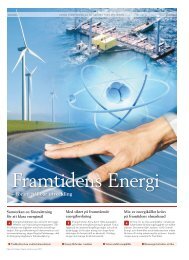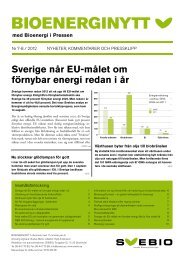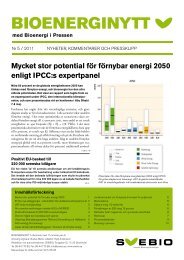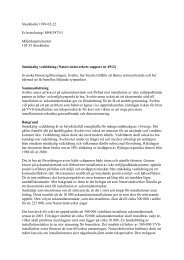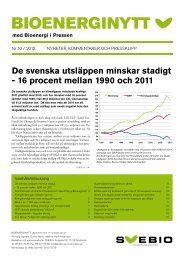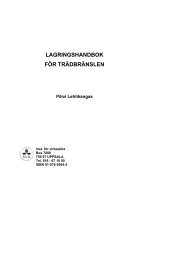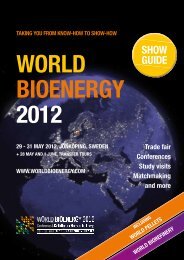Proceedings World Bioenergy 2010
Proceedings World Bioenergy 2010
Proceedings World Bioenergy 2010
Create successful ePaper yourself
Turn your PDF publications into a flip-book with our unique Google optimized e-Paper software.
of the best (if not the best) way to inform and enlist the<br />
communities into a project, are the mass media.<br />
2 CLIMATE CHANGE IN BRAZIL: PUBLIC<br />
POLICIES, POLITICAL AGENDA AND MEDIA<br />
In the face of global climate change and its<br />
repercussions in the energy, construction, industry,<br />
agriculture, commerce and industries specialized in the<br />
carbon market, the environmental issue makes entrance<br />
to the stage, especially in the election campaign for the<br />
Presidency in <strong>2010</strong>.<br />
In discussion agenda of the parties, three key points<br />
are: sanitation, violence and ethics in politics.<br />
During the current government, according to surveys<br />
by the National Institute for Space Research - INPE,<br />
deforestation in the Amazon region was approximately<br />
80,000 km² between the years 2004 and 2008. Also, the<br />
government granted an environmental license for the<br />
transposition of the São Francisco River and large dams<br />
in the Amazon.<br />
About the media coverage about climate change, we<br />
can highlight researches conducted by ANDI (News<br />
Agency for Childhood Rights) [3] in partnership with the<br />
British Embassy and British Council in Brazil, on the last<br />
12 years as pointing to relevant aspects:<br />
• Migration of a highly internationalized<br />
coverage to a more regional context and<br />
local aspects, establishing links between a<br />
so broad phenomena and the daily life of<br />
the public that access the information<br />
offered by the news vehicles;<br />
• In a first moment, the coverage of the<br />
theme was based by the perception that the<br />
responsibility for presenting solutions for<br />
the climate change issue was at the hands<br />
of foreign governments and these solutions<br />
could be reached through partnerships and<br />
agreements between nations (as in the case<br />
of the agreements for emissions reduction)<br />
(24%); more recently (2007/2008) the<br />
research pointed that this responsibility was<br />
transferred to the national government,<br />
especially the Brazilian executive power<br />
(32,2%).<br />
• There is an increase in the mention of the<br />
adaptation need allied with mitigation, due<br />
to the acceleration and escalation of the<br />
impacts caused by the climate change;<br />
• Is clearly seen a valorization of the debate<br />
around the necessity of public policies that<br />
reduce directly the volume of greenhouse<br />
gases in the atmosphere;<br />
• However, the weather unbalances keeps<br />
been approached as an issue exclusively<br />
environmental by a significant part of the<br />
Brazilian media.<br />
Below, is a table of mitigation strategies by area of<br />
incidence presented by the media in two periods:<br />
Table I: Mitigation strategies by incidence areas<br />
(% of total news relating to climate change that mention<br />
forms of mitigation - 45.9% in 2005/2007 and 51.1% in<br />
2007/2008)<br />
Incidence Areas 2005/2007 2007/2008<br />
Forests and soil use 26,4% 25,4%<br />
Energy offers 45,0% 20,8%<br />
Industry 6,8% 10,0%<br />
Carbon Credits Sales 0,0% 9,8%<br />
Transportation 7,5% 9,2%<br />
Waste 6,4% 4,9%<br />
Agriculture 4,1% 3,0%<br />
Others 3,8% 16,9%<br />
Total 100,0% 100,0%<br />
Climate Change in Brazilian Press (page 56 - Table 32)<br />
It is worth noting that the increase in the reference to<br />
"other" options, is due to the increased attention devoted<br />
mainly to focus on different processes of public<br />
awareness towards a more conscious consumption of<br />
nonrenewable resources, besides the neutralization of<br />
carbon through the planting of trees.<br />
It is not possible to think about solutions dissociated<br />
of the contexts of public policies, economic development<br />
models and consumption and behavior patterns of the<br />
contemporary societies.<br />
3 ENVIRONMENT AND LANDSCAPE: CONFLICTS<br />
AND ADVANCES<br />
The conflicts that sometimes impose itself on the<br />
relationship between public policies, natural resources<br />
depletion and landscape changes in different Brazilian<br />
ecosystems, points out the discussion of development and<br />
sustainability, since often, the eco-capitalism is<br />
incompatible with the solution of ecological problems<br />
due to their own internal rationality of the economic<br />
system based on capital accumulation.<br />
The predictability of negative impacts of capitalist<br />
production in nature dynamics is fragile, since it does not<br />
consider the local and regional geodynamic processes<br />
character.<br />
For that, one should consider and identify a set of<br />
geo-environmental units that configure large territorial<br />
compartments in which the external geodynamic<br />
processes behave similarly and can be triggered,<br />
accelerated or even intensified by different socioeconomic<br />
activities such as internal urbanization process,<br />
agriculture, mining, energy matrix exploration, infrastructure<br />
works varying magnitude according to the way<br />
which each intervention in the environment is produced.<br />
In this sense, the concept of risk is evidenced by the<br />
vision of sustainability, where restrictions on the<br />
indiscriminate use of natural resources should be defined<br />
by their ability to support and renewal.<br />
Risk analysis, according to Egler (1996) [4] has the<br />
challenge of working within the limits of behavior<br />
predictability of complex systems and, in most cases,<br />
potentially hazardous to life.<br />
The levels of environmental risks seem to be arising<br />
from three categories: natural, technological and social<br />
risks.<br />
4 SÃO PAULO STATE AND CLIMATE CHANGE<br />
INITIATIVES<br />
world bioenergy <strong>2010</strong><br />
53



